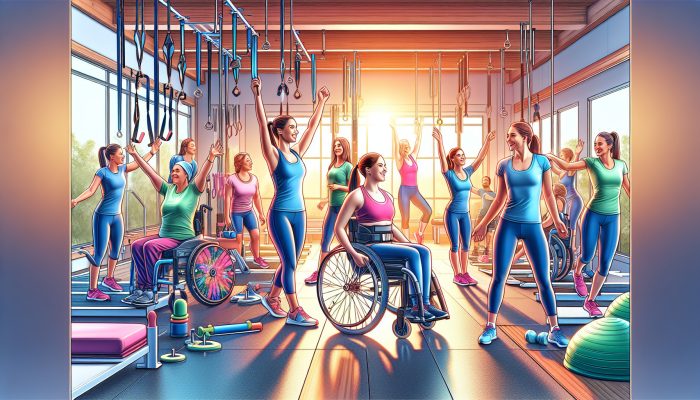Empower Women with Disabilities by Implementing Holistic Wellness Approaches
Understanding the Essence of Holistic Wellness

Wellness encompasses far more than merely the absence of illness; it represents a comprehensive state of total physical, mental, and social well-being. This broad definition incorporates various facets of health, aiming to establish a harmonious equilibrium between body and mind. Attaining genuine wellness involves nurturing a lifestyle that promotes vitality and resilience, equipping individuals to flourish in their everyday lives while effectively confronting challenges.
For women with disabilities, the journey towards wellness is frequently complicated by numerous obstacles. Their distinct needs and lived experiences call for a customized approach that considers their specific circumstances. By perceiving wellness as a multifaceted concept, we can adopt a more inclusive perspective that resonates across diverse communities, particularly among those living with disabilities.
Identifying the Unique Challenges Faced by Women with Disabilities
Women with disabilities encounter a myriad of challenges that may impede their pursuit of wellness. These hurdles often arise from inaccessible environments, societal perceptions, and systemic barriers that marginalize their experiences. For example, the lack of wheelchair accessibility in public spaces frequently discourages participation in community activities, fostering feelings of isolation.
Moreover, societal attitudes towards disability can intensify feelings of inadequacy and self-doubt, negatively affecting mental health. It is essential to comprehend the interplay of these factors, as they highlight the necessity for developing supportive frameworks that address both physical and mental wellness. The more we understand these challenges, the better positioned we become to advocate for meaningful and lasting change.
The Importance of Tailored Wellness Programs for Women with Disabilities
Developing customized wellness programs is crucial for enhancing the quality of life for women with disabilities. These programs must be inclusive and acknowledge the diversity of experiences and needs within this demographic. By concentrating on personalized strategies, we can effectively address the specific barriers that women face, resulting in increased accessibility and participation in health-related practices.
Wellness initiatives that take into account the unique circumstances of women with disabilities can boost involvement in physical activities, improve mental health outcomes, and strengthen social connections. The importance of such programs cannot be overstated, as they foster a sense of belonging and community—two fundamental elements of holistic well-being.
Implementing Effective Strategies to Enhance Wellness for Women with Disabilities

To promote wellness among women with disabilities, several effective strategies can be implemented. First and foremost, ensuring accessible healthcare is vital. This involves not only physical access to healthcare facilities but also ensuring that healthcare providers are adequately trained to understand the unique challenges faced by these women.
Furthermore, nurturing community support can establish a robust network for women with disabilities, facilitating the sharing of experiences and resources. Implementing adaptive fitness programs tailored to individual abilities is also essential for encouraging regular physical activity. By combining these strategies, we can create an inclusive environment that elevates overall well-being.
Insights from Experts on Wellness for Women with Disabilities
Key Elements That Make Wellness Programs Successful
Effective wellness programs for women with disabilities should incorporate several core elements that prioritize accessibility and adaptability. These essential components include:
- Physical Activity: Customized exercise routines designed to accommodate individual abilities.
- Mental Health Support: Access to counseling and psychological services that cater to specific needs.
- Social Engagement: Opportunities for community involvement and connection with peers.
- Nutritional Guidance: Tailored dietary advice to meet individual health requirements.
- Educational Resources: Workshops and information on various wellness topics.
- Peer Support: Facilitation of connections with others facing similar challenges.
- Access to Technology: Utilization of applications and tools that support wellness.
Each of these components plays a vital role in creating an environment that meets the diverse needs of women with disabilities. By ensuring that wellness programs are inclusive and adaptable, we can advocate for a holistic approach that empowers these women to reach their wellness aspirations.
How Healthcare Providers Can Support Wellness for Women with Disabilities

Healthcare providers play a crucial role in advancing wellness among women with disabilities. They can support wellness in various ways, starting with personalized advice and resources that consider each individual's circumstances. This tailored approach necessitates an understanding of the diverse needs of patients and providing practical solutions aimed at enhancing their health outcomes.
Healthcare professionals can take actionable steps such as conducting regular wellness assessments, referring patients to specialized services, and collaborating with community organizations to establish support networks. Engaging in training programs to raise awareness about the unique challenges faced by women with disabilities is also essential. By cultivating a supportive and empathetic healthcare environment, providers can significantly enhance the well-being of these women.
Successful Wellness Initiatives as Exemplars for Change
Examining successful wellness initiatives can offer valuable insights and inspiration for improving the lives of women with disabilities. One notable program in the UK is the Inclusive Fitness Initiative, which aims to make gyms and fitness centers more accessible and inviting for individuals with disabilities. This initiative has led to the creation of tailored fitness classes that accommodate various abilities, fostering an inclusive community atmosphere.
Another commendable example is the Women’s Health and Fitness Programme, which provides workshops focusing on physical activity, nutrition, and mental health specifically for women with disabilities. This program not only advocates for physical wellness but also promotes social interaction and mutual support among participants. Such initiatives highlight the significant impact that well-structured wellness programs can have on the lives of women with disabilities, emphasizing the importance of community-driven solutions.
The Role of Technology in Enhancing Wellness for Women with Disabilities
Technology plays a pivotal role in advancing wellness for women with disabilities. Accessible applications and online platforms provide invaluable support and resources, enabling women to engage with wellness practices from the comfort of their homes. For example, fitness applications that offer adaptive exercise routines can cater to a variety of disabilities, allowing users to personalize their workouts according to their abilities and preferences.
Additionally, virtual support groups and telehealth services have gained popularity, providing essential mental health support without the barriers associated with traveling. These technologies can be customized to meet the specific needs of women with disabilities, fostering a sense of connection and community. By harnessing technology, we can significantly improve access to wellness resources and promote holistic well-being for women with disabilities.
The Importance of Community in Supporting Wellness
The impact of community involvement on wellness is profound, particularly for women with disabilities. A supportive community can provide social connections, resources, and emotional support, all of which are crucial for enhancing wellness. Community programs that prioritize inclusivity and accessibility empower women with disabilities to actively engage in their localities, fostering a sense of belonging.
Initiatives such as community fitness classes, social events, and awareness campaigns can break down barriers and encourage participation. In the UK, numerous organizations strive to create inclusive spaces for women with disabilities, encouraging them to share their experiences and support each other. This sense of community not only enriches the lives of women with disabilities but also promotes a culture of understanding and acceptance within society.
Physical Activity and Fitness: A Pathway to Comprehensive Wellness
Essential Accessibility Features in UK Fitness Facilities
Accessible fitness facilities are vital for enabling women with disabilities to partake in regular physical activity. These establishments must be equipped with adaptive equipment and provide inclusive programs that cater to varying abilities. Key accessibility features such as ramps, wide doorways, and specialized equipment are essential for creating an environment that allows everyone to participate fully.
In the UK, many gyms and fitness centers have made noteworthy progress towards becoming more inclusive. Notable examples of accessible fitness facilities include:
- Sport England’s Inclusive Fitness Initiative centers.
- Local community gyms offering adapted equipment.
- National Health Service (NHS) fitness programs.
- Charity-run facilities designed for inclusivity.
- Online fitness platforms featuring accessible workouts.
- Local councils advocating for accessible sports initiatives.
- Adaptive sports clubs focusing on a diverse range of activities.
These facilities not only promote physical fitness but also cultivate a sense of community and belonging among participants. By prioritizing accessibility, we empower women with disabilities to lead active lives and enhance their overall health and well-being.
Identifying the Most Beneficial Types of Exercise for Women with Disabilities
When assessing the most beneficial types of exercise for women with disabilities, it is essential to acknowledge that individual preferences and abilities can vary widely. Various forms of exercise, such as swimming, yoga, and strength training, offer unique advantages tailored to individual needs. Swimming, for instance, is often recommended due to its low-impact nature, providing an excellent cardiovascular workout while being gentle on the joints.
Yoga also serves as an effective option, promoting flexibility, balance, and mental relaxation. Participants can engage in adaptive styles, making it accessible for various abilities. Strength training, when appropriately modified, can enhance muscle tone and strength, contributing to overall physical fitness. The key lies in identifying exercises that are enjoyable and sustainable, fostering a long-term commitment to an active lifestyle.
Overcoming Barriers to Physical Activity for Women with Disabilities
Barriers to physical activity for women with disabilities can be complex, encompassing inaccessible facilities, transportation challenges, and negative societal attitudes. Addressing these obstacles is crucial for promoting fitness and wellness. One effective strategy involves advocating for improved accessibility in infrastructure, such as public transport equipped with wheelchair access and gym facilities featuring adaptive equipment.
Moreover, raising awareness about the importance of inclusion within fitness communities can help dismantle negative societal perceptions. Creating an environment that welcomes and supports women with disabilities encourages participation and fosters a sense of belonging. Community outreach programs can also facilitate transportation options, ensuring that women can access fitness facilities and activities without undue stress or barriers.
Mental Health and Emotional Well-being: Core Elements of Holistic Wellness
Common Mental Health Challenges Encountered by Women with Disabilities
Women with disabilities may experience higher rates of depression, anxiety, and other mental health issues due to the combination of societal and personal challenges. The stigma surrounding disability can amplify feelings of isolation and inadequacy, further impacting mental health. Recognizing these common challenges is essential for developing effective support strategies.
Typical mental health challenges may encompass feelings of low self-esteem, chronic stress linked to navigating inaccessible environments, and anxiety stemming from societal expectations. Acknowledging these issues allows us to address the underlying factors contributing to mental health struggles. This understanding serves as the first step toward implementing effective interventions that promote emotional well-being for women with disabilities.
Strategies to Enhance Emotional Well-being
Enhancing emotional well-being necessitates a multifaceted approach that incorporates self-care practices, social support, and professional assistance. Self-care may involve activities such as mindfulness, meditation, and engaging in hobbies that bring joy. Women with disabilities should be encouraged to prioritize their mental health by dedicating time for self-care and relaxation.
Social support significantly contributes to emotional well-being. Connecting with friends, family, or support groups can foster a sense of belonging and validation. Peer support groups specifically designed for women with disabilities can be particularly impactful, providing a safe space to share experiences and challenges while nurturing community solidarity. Additionally, seeking professional help from mental health practitioners who understand the unique needs of women with disabilities can offer valuable strategies for managing mental health challenges.
Accessing Mental Health Services in the UK: A Pathway to Support
Accessing mental health services can be challenging for women with disabilities, often due to systemic barriers and a lack of awareness regarding available resources. It is critical for these women to be informed about the various mental health services available in the UK, such as NHS mental health services, community support groups, and online therapy options. Familiarity with these resources can empower women to seek help when needed.
Navigating the healthcare system may require assistance, and women with disabilities should feel encouraged to seek help from support networks or advocacy groups. Furthermore, healthcare providers must be trained to identify and address the unique challenges faced by these women, ensuring they receive appropriate referrals and support. By improving access to mental health services, we can make significant strides in enhancing emotional well-being for women with disabilities.
The Role of Community and Peer Support in Mental Health
Community and peer support groups provide invaluable emotional and practical assistance for women with disabilities, enhancing their mental health and emotional well-being. These groups create a platform for sharing experiences, challenges, and strategies, fostering a sense of connection and understanding among participants. Such interactions can alleviate feelings of isolation and empower women to advocate for their wellness needs.
In the UK, numerous organizations facilitate peer support networks specifically for women with disabilities, allowing them to exchange insights and resources in a nurturing environment. Participating in these groups can strengthen self-esteem and increase resilience, ultimately improving overall quality of life. The collective strength found within these communities is essential for promoting emotional well-being, encouraging women to actively pursue their wellness goals.
Research-Backed Benefits of Engaging in Wellness Programs for Women with Disabilities
The Influence of Participation in Wellness Programs on Quality of Life
Engagement in wellness programs significantly enhances the quality of life for women with disabilities. Research indicates that holistic health approaches—including physical fitness, mental well-being, and social connection—are linked to improved health outcomes. When women with disabilities participate in structured wellness initiatives, they often report enhanced physical health, reduced symptoms of anxiety and depression, and a greater sense of community.
Moreover, wellness programs can foster a sense of empowerment, encouraging women to take charge of their health and well-being. The positive effects on quality of life extend beyond the individual level, contributing to stronger family and community relationships. Through these programs, women can build resilience and adopt a proactive approach to their health, leading to long-term benefits and improved overall well-being.
Long-Term Health Benefits of Consistent Wellness Practices
Regular engagement in wellness practices can yield substantial long-term health benefits for women with disabilities. Studies reveal that consistent participation in physical activity, coupled with mental health support and social interaction, can significantly reduce the risk of chronic diseases such as obesity, diabetes, and cardiovascular issues. Additionally, improved mental health outcomes are associated with routine wellness practices, resulting in lower rates of anxiety and depression.
Furthermore, the benefits of wellness extend to enhanced cognitive function and improved sleep quality, both essential for overall health. By adopting sustained wellness practices, women with disabilities can enhance their longevity and quality of life. These findings underscore the importance of integrating wellness strategies into daily routines, reinforcing the notion that proactive health management is vital for holistic well-being.
The Critical Role of Social Engagement in Wellness
Social engagement is a vital aspect of wellness, particularly for women with disabilities, as it helps alleviate feelings of isolation and loneliness. Participating in inclusive social activities can enhance overall mental health and emotional well-being. These engagements provide opportunities for women to connect with others, share experiences, and establish supportive friendships that contribute to a sense of belonging.
Engaging in community events, support groups, and social outings allows women with disabilities to interact meaningfully with their surroundings. Research indicates that individuals who maintain strong social connections experience better mental health outcomes and greater resilience when facing challenges. Thus, promoting social engagement within wellness initiatives is essential for empowering women with disabilities to lead fulfilling and connected lives.
Nutrition and Healthy Eating: Fundamental for Overall Well-being
Nutritional Considerations for Women with Disabilities
Women with disabilities may have distinct nutritional needs based on their specific health conditions and lifestyles. Achieving optimal nutrition is crucial for enhancing overall wellness, as it supports physical health, mental clarity, and emotional stability. A balanced diet tailored to these unique needs can help manage symptoms, boost energy levels, and promote overall health.
Key nutritional considerations involve adequate protein intake for muscle maintenance, essential fatty acids for brain health, and sufficient vitamins and minerals to support immune function. Additionally, women with disabilities should be mindful of hydration, as proper fluid intake is crucial for overall health. Personalized dietary guidance from registered dietitians can provide tailored recommendations to meet individual health needs.
Accessible Cooking and Meal Preparation Tools for Women with Disabilities
Accessible cooking and meal preparation tools are essential for assisting women with disabilities in maintaining a nutritious diet. These tools should be designed to accommodate various abilities and facilitate ease of use. For instance, adaptive utensils, ergonomic kitchen gadgets, and modified cooking appliances can empower women to prepare healthy meals independently.
Creating accessible kitchen environments can further enhance the cooking experience, allowing women to explore diverse dietary options. Ensuring accessibility in meal preparation not only promotes healthy eating habits but also fosters a sense of independence and accomplishment. Encouraging women to engage in cooking can enrich their nutritional knowledge and empower them to make informed dietary choices.
Available Resources in the UK to Promote Healthy Eating
The UK offers a wealth of resources that support healthy eating for women with disabilities. Various organizations and community initiatives focus on promoting nutrition and healthy cooking by providing accessible cooking classes, workshops, and nutritional advice services. These resources equip women to enhance their culinary skills and make informed dietary choices.
Additionally, local health services often provide nutritional consultations tailored to individual needs, assisting women with disabilities in integrating healthy eating habits into their daily routines. Online platforms and resources, such as recipe blogs and cooking videos, can further complement these initiatives, making healthy eating more attainable. By utilizing these resources, women can cultivate healthier eating patterns that support their overall wellness.
Effective Wellness Strategies Tailored for Women with Disabilities
Setting Realistic Wellness Goals for Women with Disabilities
Establishing achievable wellness goals is crucial for attaining sustainable progress and success. Women with disabilities should consider their unique circumstances and capabilities when formulating these goals. Utilizing the SMART criteria—Specific, Measurable, Achievable, Relevant, and Time-bound—can be highly beneficial in developing wellness objectives.
Actionable steps for establishing attainable wellness goals include identifying personal health priorities, breaking goals down into smaller, manageable tasks, and regularly assessing progress. By focusing on achievable objectives, women with disabilities can build confidence and motivation, simplifying their wellness journey. Establishing a supportive network can also aid in goal attainment, providing encouragement and accountability.
The Significance of a Support Network in Wellness
A robust support network can significantly enhance wellness efforts for women with disabilities. This network may consist of family, friends, healthcare providers, and community resources dedicated to supporting women in their wellness journeys. Building such a network requires proactive engagement and open communication about personal needs and goals.
Support groups tailored for women with disabilities can offer invaluable resources and emotional backing. Connecting with others who share similar experiences allows women to cultivate a sense of community and solidarity. Additionally, healthcare professionals can play a pivotal role by providing personalized advice and resources to help women achieve their wellness ambitions. Together, these connections empower women to take charge of their health and well-being.
Best Practices for Sustaining Wellness
Maintaining wellness necessitates consistent effort and the implementation of best practices that cater to the individual needs of women with disabilities. These practices may encompass regular physical activity, mindfulness, balanced nutrition, and social engagement. Establishing a routine that integrates these elements can foster a sustainable approach to wellness.
Women should also prioritize self-care and seek professional support when necessary. Continuous education about health and wellness can further enrich their knowledge and empower them to make informed decisions. Engaging with community resources and support networks can provide additional motivation and encouragement, reinforcing a commitment to maintaining wellness throughout life.
The Transformative Impact of Accessible Fitness Programs for Women with Disabilities
Accessible fitness programs offer numerous benefits for women with disabilities, promoting both physical health and overall well-being. These programs are designed to accommodate the specific needs and abilities of participants, ensuring that everyone can engage in physical activity comfortably and confidently. This inclusivity fosters a sense of empowerment and belonging, encouraging ongoing participation.
By providing adaptive equipment and trained instructors, accessible fitness programs can enhance physical fitness, improve mental health, and foster social connections among participants. The positive impacts extend beyond physical health, as women with disabilities often report increased self-esteem, improved body image, and greater overall satisfaction with life when participating in such programs. Therefore, promoting accessible fitness initiatives is crucial for empowering women with disabilities to lead active, fulfilling lives.
The Interconnection Between Mental Health and Overall Wellness for Women with Disabilities
Mental health serves as a cornerstone of overall wellness for women with disabilities. Mental well-being influences physical health, social engagement, and emotional resilience, all of which are interconnected aspects of a holistic approach to wellness. Women with disabilities frequently face unique mental health challenges due to societal stigma and the personal impact of their conditions.
Access to mental health resources, such as counseling and support groups, is essential for addressing these challenges. By prioritizing mental health alongside physical wellness, women can cultivate a more balanced and fulfilling life. Engaging in wellness practices that promote mental health—such as mindfulness, social interaction, and accessible fitness—can significantly elevate overall well-being and empower women with disabilities to thrive.
Community and Social Engagement: Fundamental Elements of Wellness
Advantages of Accessible Community Events and Activities
Accessible community events and activities play an essential role in enhancing social engagement and wellness for women with disabilities. These events should be designed to accommodate diverse needs, ensuring inclusivity and participation. By creating accessible opportunities, communities can nurture a sense of belonging and connection among women with disabilities.
Examples of accessible community events range from open-air concerts with designated seating to inclusive sports days and workshops focused on arts and crafts. These activities not only encourage social interaction but also provide avenues for personal growth and self-expression. By emphasizing accessibility, communities can create welcoming spaces that motivate women with disabilities to engage actively and meaningfully.
Connecting Women with Disabilities to Their Communities
Engaging with the community can significantly enhance wellness by providing women with disabilities a sense of belonging and purpose. Women should seek inclusive opportunities that align with their interests and abilities, allowing them to positively contribute to their communities. Volunteering, joining community groups, or participating in local events can be excellent pathways for engagement.
Furthermore, women with disabilities can utilize online platforms to connect with others who share similar interests, facilitating greater community involvement. By actively participating in their communities, women can build meaningful relationships, enhance their social skills, and experience a sense of accomplishment. This involvement not only benefits personal wellness but also contributes to building more inclusive communities.
Benefits of Support Groups and Peer Networks for Women with Disabilities in the UK
Support groups and peer networks are invaluable resources for women with disabilities, providing emotional support and practical assistance. These groups can be found throughout the UK, offering safe spaces for women to share experiences and resources while fostering community solidarity. Engaging in these networks enhances mental health and emotional well-being, enabling women to navigate the challenges they encounter more effectively.
Many organizations facilitate these support groups, focusing on various aspects of life with disabilities. By connecting with peers who understand their experiences, women can gain insights and encouragement to pursue their wellness goals. These groups not only enhance personal growth but also empower women to advocate for their needs within the broader society. The collective strength found within support networks is crucial for promoting wellness among women with disabilities.
Addressing Common Inquiries About Wellness for Women with Disabilities
Defining Wellness for Women with Disabilities
Wellness for women with disabilities encompasses a holistic approach to health that includes physical, mental, and social well-being, tailored to address the specific challenges they may encounter.
The Necessity of Customized Wellness Programs
Customized wellness programs are essential as they address the unique needs of women with disabilities, fostering inclusivity and assisting in overcoming barriers to achieving wellness.
How Healthcare Providers Can Assist Women with Disabilities in Achieving Wellness
Healthcare providers can support wellness by offering tailored advice, resources, and fostering inclusive healthcare environments that recognize the unique challenges faced by women with disabilities.
Identifying the Most Beneficial Exercise Types for Women with Disabilities
Beneficial exercises for women with disabilities include swimming, yoga, strength training, and other adaptable fitness routines that can be customized to individual abilities and preferences.
Technology's Contribution to Enhancing Wellness
Technology enhances wellness by providing accessible apps, virtual support groups, and telehealth services, enabling women with disabilities to engage with wellness practices easily and effectively.
Setting Realistic Wellness Goals for Women with Disabilities
Women with disabilities can establish realistic wellness goals by applying the SMART criteria (Specific, Measurable, Achievable, Relevant, Time-bound) and dividing objectives into manageable tasks.
Common Mental Health Challenges for Women with Disabilities
Common mental health challenges for women with disabilities include depression, anxiety, low self-esteem, and social isolation, often exacerbated by societal attitudes and personal experiences.
The Impact of Community Involvement on Wellness
Community involvement enhances wellness by fostering social connections, providing opportunities for engagement, and cultivating a sense of belonging, all of which are critical for emotional and mental well-being.
Nutritional Aspects for Women with Disabilities
Women with disabilities should be aware of their specific nutritional needs, including adequate protein intake, essential fatty acids, vitamins, and hydration to support their overall health and wellness.
Benefits of Support Groups for Women with Disabilities
Support groups benefit women with disabilities by providing emotional support, practical resources, and fostering a sense of community and empowerment, thus enhancing their overall well-being.
Connect with us on Facebook!
The Article Wellness for Women with Disabilities: UK Guide Was First Published On https://acupuncture-frome.co.uk
The Article Wellness Guide for Women with Disabilities in the UK Was Found On https://limitsofstrategy.com

